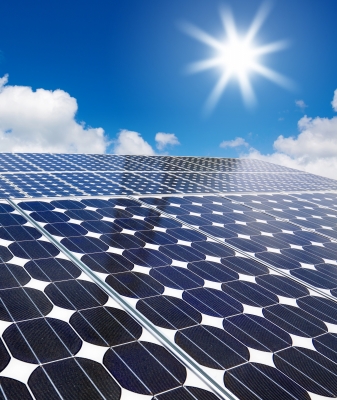The lure of reducing or eliminating power bills is making most homeowners and businesses think long and hard about converting to solar power for electricity. As prices for solar panels continue to drop, due to technological advances and demand, the pendulum has shifted to a massive wave of new system installations. Add to that government programs, incentives, and tax credits, and the solar industry sees itself in the middle of a huge growth phase.
How can YOU benefit from Solar’s Explosive Growth?

Solar installer job opportunities are set to continue their explosive growth
If you’re just starting your working career, are looking for a career change, or simply are enamored with the entire concept of solar power, you may be considering an opportunity as a solar power system installer. If so, you probably have plenty of questions, like:
- How do I get the training that I’ll need?
- How much will it cost to get started?
- What equipment will I need to have?
- How fast is the market growing?
- How much can I expect to earn?
This guide will answer those questions for you…
Where can you get trained?
Whenever an emerging industry is in an explosive growth phase, it is sure that one of the growing industries alongside it will be developed by those that support and train new entrants into the field. Such is the case with solar power system training. There are literally dozens of places where you can get the training you need to enter this booming field. Even the government is involved with various programs, such as the Solar Ready Vets Program. This program has helped to contribute to an employment growth rate of more than 20% in the solar power industry, over the last four consecutive years.
One of the things to consider when choosing a training program is to make sure you are able to earn nationally-recognized credentials, such as certification by NABCEP, once you pass their exam. Solar Energy International is one company that offers training that qualifies students for NABCEP certification. They have a 30 year history of providing solar training for various skill levels in the industry.
Keep in mind that there could be different levels of training involved depending on your ultimate goal, including associate training, advanced training, and mastery training. You may also benefit from training that is specifically for learning how to provide technical sales or for solar power system design.
What does it cost to get started?
When it comes to the costs you will incur to begin a career as a solar power system installer, a great deal depends on how you plan to enter the workplace once your training is completed. Generally, you can get started for a few hundred dollars to become an installer or thousands to start your own installation business.
Your initial costs will vary, depending on whether you will be starting your own business or seeking employment from an established business. If you are seeking employment, it will also depend on what the company provides and what they expect you to have on your own. Some provide everything, including training, a vehicle, tools, equipment, and perhaps uniforms. Others provide very little.
Planning to have the tools you’ll need, will give you more options and perhaps even earn you a higher pay rate. You’ll find that the majority of tools you need are pretty basic and you may already own a few of them. You will need a few specialized items, but even those are easy to find and relatively affordable.
Obviously, if you are going to start a solar panel installation business you will have all the start-up expenses and capital funds to get the business established. That can run several thousands of dollars, depending on whether you plan to work independently or hire a crew. You should take the time to develop a business plan, including a break-even analysis and marketing strategy.
What equipment do you need?
Other than a vehicle for getting to job sites, there isn’t much equipment involved with being a solar power system installer. There are a couple dozen tools that will be needed and helpful. What equipment you’ll need depends on whether you will be doing grid-tied systems or battery systems, or both. To get a better idea of some of the basic types of tools and equipment you’ll need, see our DIY Solar Installation Checklist.
For either type, you may need to have a solar pathfinder. This piece of equipment enables you to evaluate the solar energy potential at each job site. Other helpful equipment to have includes a cordless drill with multiple batteries, hole saw, a torque wrench with deep sockets, nut drivers, AC/DC multimeter, reciprocating saw, right angle drill, small flashlight, and stud finder. If you will be working with battery systems, you will also want a refractometer or hydrometer, and voltmeter.
How fast is the market growing?
According to the 2016 national solar jobs census by the Solar Foundation, “The installation sector grew by almost 24% since November 2014 and by 173% since 2010.” Jobs in the solar power industry overall are continuing to grow with the installation sector being the fastest growing of them all.
How much can you make?

Solar installation professionals are going to be in high demand for many decades to come.
Most solar power system installers first begin as an employee working for a solar power provider. Although it is rare to jump right into owning your own company, it can be done if you have the capital to do it. As for being an employee, the amount you can make as a starting salary will depend on the rest of your background. A standard installer, newly trained, can expect to earn between $25,000 and $50,000 per year, including bonuses. If you also have a general contractor license or electrician training, you could make more. Obviously, the region you live in will further influence earnings potential.
Solar installation positions also offer you a great starting point in fast growing solar companies. Your experience as a hands-on solar installer can make you very valuable as these companies looks to fill higher paying positions in sales, design and management.
As the solar industry continues it’s rapid growth, the need for solar installers is set to grow at record levels. All signs are pointing to the fact that solar installation professionals are going to be in high demand for many decades to come.
With a growing future, good entry level salary, relatively short amount of training, low investment for tools and equipment, solar installation seems to be a simple field to enter, with a very big future. Most companies offer a nice benefit and bonus package, besides. While there are other areas in the solar industry that you could consider such as solar power system design, maintenance operations, or solar panel cleaning, it seems that you can’t go wrong pursuing the opportunity as a solar panel system installer while helping homeowners and businesses pursue their ultimate goal of energy savings and independence.

Leave a Reply